Handling family tension at weddings involves setting clear boundaries early, choosing a neutral venue, and blending family traditions for harmony.
On the wedding day, arrange seating strategically and communicate roles openly. If conflict arises, address it calmly with deep breathing and discreet signals.
After the celebration, strengthen relationships with open dialogue and respect for personal boundaries. Consider professional mediation if issues persist, and you’ll discover more strategies for a smooth, love-centred celebration.
Understanding Family Dynamics in Wedding Planning
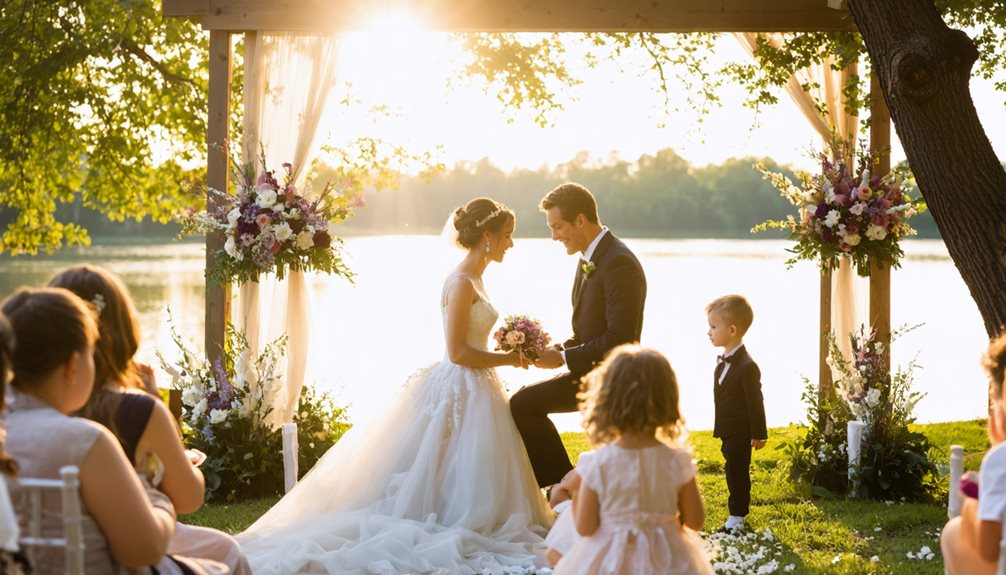
You’ll find that weddings often highlight the complexities of family dynamics, sparking tension as roles and relationships shift. Common conflicts can arise from differing opinions on the ceremony’s details, with family members sometimes prioritizing their preferences over the couple’s wishes. Understanding these sources of tension helps you navigate planning with empathy and clear communication, keeping the focus on celebrating love.
Why Weddings Can Spark Tension Between Families
When planning a wedding, the convergence of unique family dynamics can spark unexpected tensions. Shifts in roles, feelings of loss, or discomfort can arise, as family members adjust to changing relationships. Past conflicts may resurface, causing emotional strain. Balancing expectations whilst honouring your vision can be tricky. Understanding these dynamics helps you set boundaries and communicate proactively, ensuring a celebration that reflects your love.
Common Sources of Family Conflict During the Marriage Ceremony
As you immerse yourself in wedding planning, it’s important to recognise that family dynamics can be a common source of conflict during the ceremony. Unresolved issues, differing expectations, and past grievances often resurface in the emotionally charged atmosphere. Disagreements over guest lists, roles, and traditions can ignite disputes. Estranged relatives might create tension, while poor communication can lead to misunderstandings, overshadowing the joy of your special day.
Preparing for Your Wedding: Proactive Steps to Reduce Stress
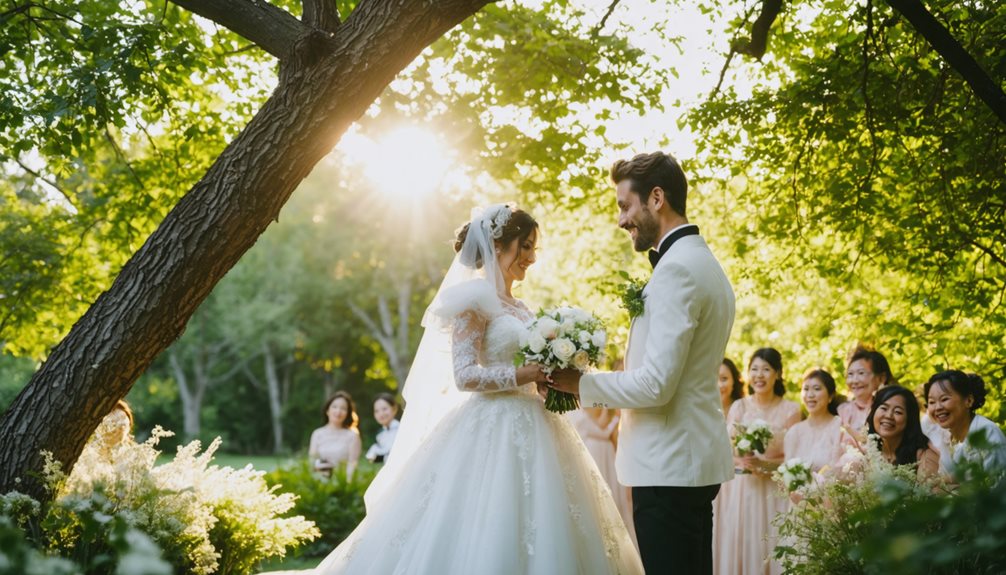
To reduce stress during your wedding planning, start by setting clear boundaries with family members early on. Choose a venue that makes everyone feel at ease, helping to minimize potential tensions. Consider blending traditions to create a unique ceremony that honors both families and fosters unity.
Setting Boundaries Early in the Wedding Planning Experience
Establishing boundaries early in the wedding planning process sets the stage for a smoother and less stressful experience. Clearly define roles with family, ensuring everyone understands their limits. Communicate assertively and utilise a wedding planner to mediate if tensions arise. Document expectations to provide clarity. Regularly check in with your partner, adjusting boundaries as needed, keeping your love and connection at the forefront.
Choosing a Wedding Venue That Helps Everyone Feel Comfortable
When planning your wedding, picking the right venue plays an essential role in ensuring everyone feels at ease. Choose a neutral location without emotional ties to minimise tension. Opt for venues with ample space and private areas for needed breaks. Strategically arrange seating to keep potential conflicts apart. Share the venue’s layout early with family members to set expectations and foster comfort.
Blending Traditions for a Unique Wedding Ceremony
While planning your wedding, blending traditions from both families can create a unique and meaningful ceremony. Openly communicate with your families about which traditions you’d like to incorporate, ensuring everyone feels valued and included. Research the significance of each tradition to select those that resonate with your values. Consider symbolic rituals, like unity ceremonies, to visually represent your commitment, fostering harmony and reducing stress on your special day.
Navigating Family Dynamics on the Big Day
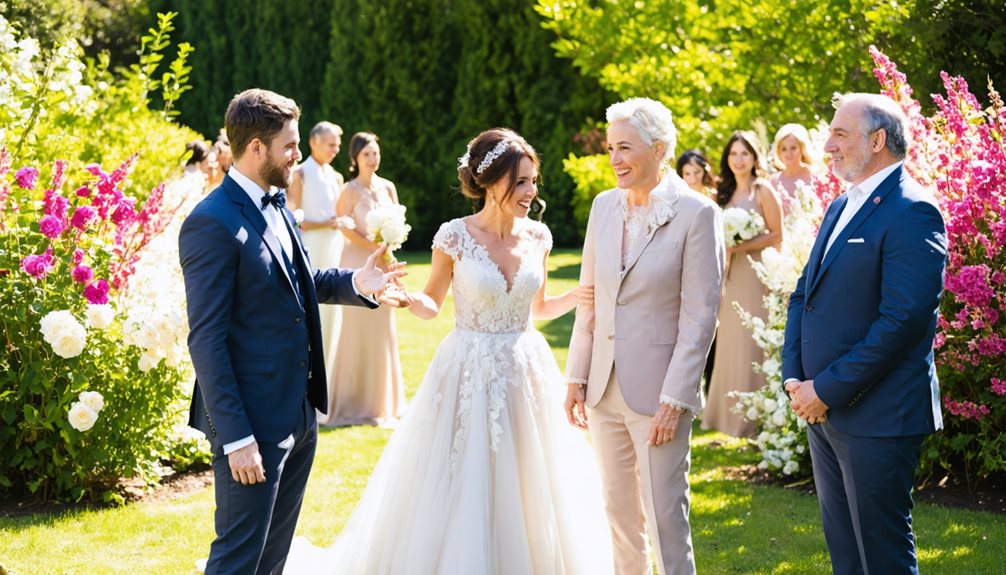
On your wedding day, strategic seating arrangements and clear ceremony etiquette can prevent unnecessary drama. When managing step-families, separated parents, and extended family members, it’s important to communicate clearly and maintain a calm demeanor. By setting boundaries and focusing on celebrating love, you can guarantee everyone respects the joyous occasion.
Seating Arrangements and Ceremony Etiquette
Crafting a thoughtful seating arrangement can be key to managing family dynamics on your wedding day. Place conflicting relatives apart to ease tension. Share the plan in advance, helping guests feel more at ease. Rely on a wedding planner to mediate sensitive discussions. Assign roles reflecting current relationships, like who walks you down the aisle. Clearly set behaviour expectations to guarantee a positive atmosphere.
Managing Step-Families, Separated Parents, and Extended Families
Managing family dynamics on your wedding day, especially with step-families, separated parents, and extended relatives, can be challenging but manageable. Strategically seat family members to minimise tension. Communicate roles openly and set boundaries to guarantee a peaceful day. Engage a neutral mediator, like a wedding planner, to address concerns. Connect with family individually before or after the ceremony for personal, pressure-free interactions.
| Strategy | Benefit |
|---|---|
| Strategic seating | Minimises potential conflicts |
| Open communication | Fosters understanding and respect |
| Neutral mediator | Guarantees inclusion and cooperation |
Tips for Communicating Calmly With Relatives
When managing family dynamics on your wedding day, maintaining calm communication with relatives can be challenging but essential for a harmonious celebration. Use “I” statements to express feelings, minimising defensiveness. Choose private settings for discussions to avoid distractions. Anticipate reactions and stay assertive. Enforce boundaries consistently. Brief private moments can acknowledge relatives, diffusing tension and nurturing a peaceful, intimate atmosphere.
What to Do if Conflict Arises During the Ceremony
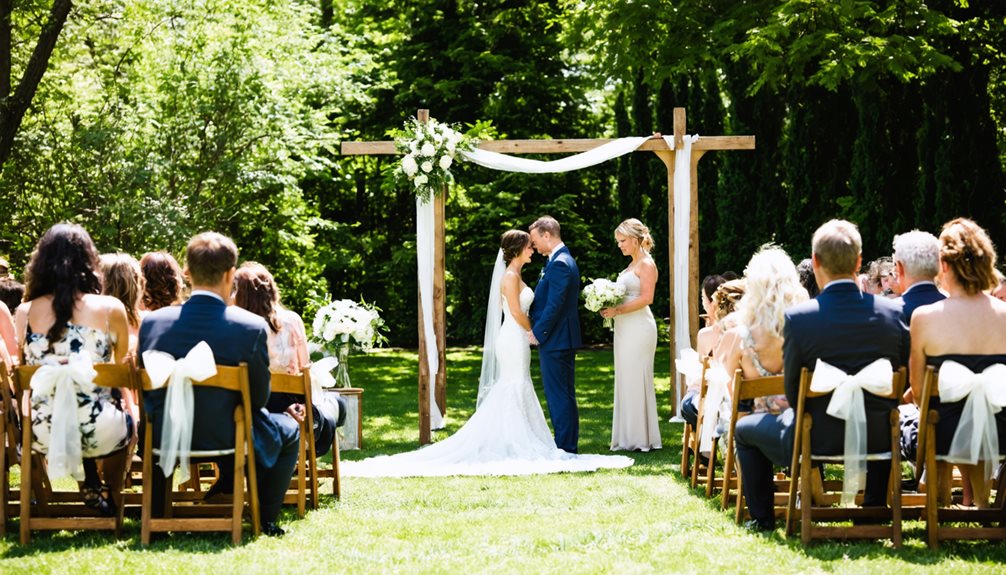
If conflict arises during the ceremony, it’s vital to address it calmly and promptly. Have a designated person, like the wedding planner or a trusted family member, ready to step in and defuse tense moments. The celebrant can also play an important role in maintaining the ceremony’s flow while handling any unexpected behavior with grace.
How to Defuse Tense Moments in Real Time
Although weddings are joyous occasions, tensions can unexpectedly arise. Stay calm, using deep breathing techniques to manage emotions. Discreetly signal your partner to step away if needed. Redirect focus to the day’s joy with gentle reminders of love and unity.
| Strategy | Action | Result |
|---|---|---|
| Deep breathing | Calm your emotions | Prevent escalation |
| Nonverbal signals | Communicate discreetly | Avoid confrontation |
| Gentle redirection | Focus on celebration | Maintain harmony |
Who Should Step In? Role of the Celebrant or Wedding Planner
During a wedding ceremony, unexpected family tensions might arise, and it’s crucial to have a plan in place. Entrust the celebrant or wedding planner to step in as neutral mediators. They’ll maintain calm, use discreet signals to manage disputes, and shift focus back to the couple. By knowing family dynamics beforehand, they can guarantee the celebration remains joyful, intimate, and uninterrupted by conflict. These trained professionals are especially valuable during wedding ceremonies on the Gold Coast, where picturesque settings can sometimes amplify emotions. Their ability to manage family dynamics allows couples to focus on the joy of the day without the added stress of potential conflicts. This proactive approach ensures that every moment remains cherished, enhancing the overall experience for both the couple and their guests.
Handling Unexpected Behaviour with Grace
When unexpected conflicts arise during your wedding ceremony, it is essential to stay calm and composed. Take deep breaths and use a pre-agreed signal with your partner to step away discreetly. Let a trusted family member or wedding planner intervene. After the ceremony, address the issue privately. Remember, this day celebrates your love, so focus on joy and minimise disruptions for a memorable event.
After the Wedding: Moving Forward as a Family
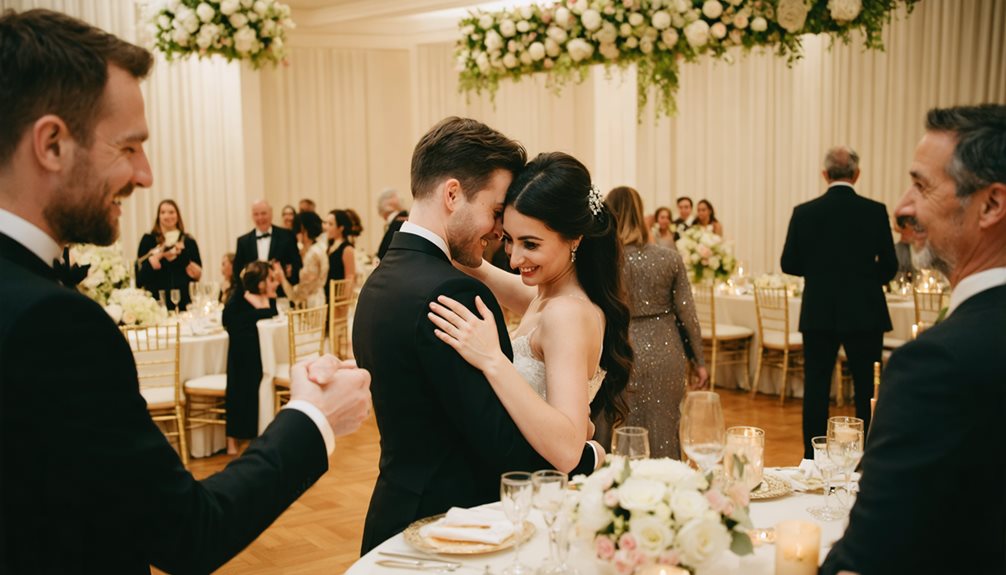
After the wedding, keeping communication open with family members is key to strengthening relationships and resolving any leftover tension. Plan regular family gatherings or individual check-ins to build connections and set clear expectations. If conflicts persist, don’t hesitate to seek outside support or mediation to guarantee a harmonious family dynamic.
Strengthening Relationships After the Ceremony
Although the wedding day marks a significant milestone, it’s crucial to focus on strengthening family relationships as you move forward. Keep communication open to heal any lingering tensions. Schedule intimate gatherings for genuine conversations, and validate each other’s feelings to nurture belonging. Engage in shared activities that foster teamwork. By respecting boundaries, you’ll maintain a healthy dynamic and create lasting, joyful memories together.
When to Seek Outside Support or Mediation
Strengthening family relationships post-wedding is essential, but sometimes tensions persist despite best efforts. If unresolved issues linger, consider seeking professional mediation to facilitate healing conversations. A family therapist offers a safe space for everyone to express feelings and address conflicts. Regular family meetings and clear boundaries can further prevent misunderstandings. Encourage open dialogue about the wedding experience to foster reflection, healing, and lasting connections.
Frequently Asked Questions About Wedding Etiquette and Family Tension
How can you guarantee a smooth wedding day amidst potential family tensions? Start by communicating seating arrangements early to ease worries. Discuss family dynamics with vendors—they’re skilled at handling delicate moments. Set boundaries with challenging relatives and openly strategise with your partner to support each other. Keep your focus on celebrating your love, not conflicts, ensuring joy fills your special day.
Final Thoughts
As you journey through the wedding preparations, remember that taking a proactive approach can significantly ease family tensions. Encourage open communication and focus on the couple’s happiness, setting the stage for a memorable celebration. If conflicts pop up, your efforts in maintaining harmony can turn potential disputes into opportunities for unity. Think of it like turning lemons into lemonade. Keep your attention on the joy of the occasion and the love that unites everyone. This will ensure the wedding becomes a cherished memory for all involved.
By fostering a positive atmosphere, you help transform stress into joy. Imagine the event as a tapestry where each thread, representing family members, weaves together into a beautiful pattern. With a bit of humour and understanding, even the most challenging situations can become stories to laugh about later. Your role is crucial in keeping the focus on the joy and love that bring everyone together. As you navigate this path, remember the wedding is not just a day; it’s a collection of precious memories waiting to be created.